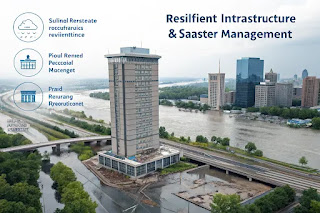The Future of Civil Engineering: Innovations, Challenges, and Opportunities
Civil engineering
has long been the backbone of human civilization, shaping our cities,
infrastructure, and daily lives. As we move into the future, the field is undergoing
a radical transformation driven by technological advancements, sustainability
concerns, and increasing global challenges. In this blog, we will explore the
key trends shaping the future of civil engineering and the opportunities they
present.
1. Smart Cities and Infrastructure
One of the most
significant trends in civil engineering is the development of smart cities.
With rapid urbanization, the demand for intelligent infrastructure that
integrates technology with urban planning is rising. Engineers are now
incorporating IoT (Internet of Things) sensors, AI-driven analytics, and big
data to create efficient and responsive urban environments. These technologies
enable real-time monitoring of traffic, water supply, waste management, and
structural health, ensuring proactive maintenance and improved quality of life.
2. Sustainable and Green Construction
Sustainability is no longer an option but a necessity in modern civil engineering. The construction industry is responsible for nearly 40% of global carbon emissions, making it imperative to adopt eco-friendly practices. The future will see increased use of sustainable materials such as carbon-negative concrete, self-healing bioconcrete, and recycled plastic bricks. Additionally, green buildings with energy-efficient designs, solar integration, and rainwater harvesting systems will become the norm.
3. 3D Printing and Modular Construction
The advent of 3D printing has revolutionized construction methods, allowing for rapid, cost-effective, and precise building techniques. 3D-printed structures reduce material waste and labor costs while enhancing customization. Similarly, modular construction, where pre-fabricated units are assembled on-site, is gaining traction due to its speed and efficiency. These methods will significantly impact the housing industry, making affordable housing more accessible worldwide.
4. Artificial Intelligence (AI) and Automation
AI and automation are transforming every aspect of civil engineering, from design and planning to construction and maintenance. AI-driven software can optimize structural designs, predict potential failures, and enhance safety protocols. Drones and robotic machinery are increasingly used for site inspections, reducing risks and improving efficiency. Automation in construction not only accelerates project timelines but also minimizes human error, leading to safer and more durable structures.
5. Resilient Infrastructure and Disaster Management
With climate change causing more frequent and severe natural disasters, civil engineers are focusing on building resilient infrastructure. Innovations such as earthquake-resistant buildings, flood-resistant urban planning, and climate-adaptive structures are becoming crucial. Advanced geotechnical engineering and predictive modeling help anticipate disasters and mitigate their impact, ensuring safer communities.
6. Advanced Materials and Nanotechnology
The future of
civil engineering lies in the development of high-performance materials.
Nanotechnology is enabling the creation of stronger, more durable, and
self-repairing materials. Smart concrete, embedded with nanomaterials, can
detect cracks and heal itself, reducing maintenance costs. Similarly, advanced
composites and graphene-based materials promise to enhance the strength and
longevity of structures while being lightweight and eco-friendly.
7. Augmented Reality (AR) and Virtual Reality (VR) in Engineering
AR and VR are revolutionizing civil engineering by providing immersive visualization tools. Engineers and architects can now create virtual models of projects, allowing stakeholders to experience the design before construction begins. These technologies enhance collaboration, reduce errors, and streamline project approvals, making construction more efficient and cost-effective.
8. Water Resource Management and Smart Irrigation
With the global water crisis intensifying, civil engineers are playing a crucial role in developing sustainable water management solutions. Smart irrigation systems powered by AI can optimize water usage in agriculture, reducing waste and improving crop yields. Advanced desalination technologies and wastewater recycling systems are also being implemented to ensure a sustainable water supply for growing populations.
9. The Role of Civil Engineers in Space Exploration
Beyond Earth, civil engineers are increasingly contributing to space exploration. Lunar and Martian colonies require specialized infrastructure, and engineers are developing self-sustaining habitats using 3D printing and in-situ resource utilization (ISRU). Future space missions will rely on civil engineering expertise to create habitable structures in extreme environments, paving the way for interplanetary colonization.
10. Challenges and Ethical Considerations
While the future of civil engineering is promising, it also comes with challenges. Ethical concerns related to automation and job displacement need to be addressed. Engineers must balance technological innovation with environmental sustainability, ensuring that advancements do not compromise ecological balance. Additionally, cybersecurity threats to smart infrastructure demand robust protective measures to safeguard critical systems from cyberattacks.
Conclusion
The future of
civil engineering is dynamic and full of potential. By embracing smart
technologies, sustainable practices, and innovative construction methods,
engineers can shape a world that is more efficient, resilient, and
environmentally conscious. As the industry continues to evolve, civil engineers
will play a vital role in designing solutions for global challenges, ensuring a
better and more sustainable future for generations to come.
Call to Action
Are you excited
about the future of civil engineering? Stay updated with the latest trends and
innovations by following our blog. If you're an aspiring civil engineer, now is
the perfect time to equip yourself with the skills needed to drive these
groundbreaking advancements!













This comment has been removed by a blog administrator.
ReplyDeleteNice Information for civil field
ReplyDeleteKeep writing like this about innovations in civil engineering
ReplyDeleteGreat blog keep providing information like this
ReplyDeleteGreat blog
ReplyDeleteIt serves as a valuable resource for understanding the current innovations and future directions in the field.
ReplyDeleteThe future of civil engineering is dynamic Keep Publishing!
ReplyDeleteGreat insights into the future of civil engineering! The integration of AI and smart materials will truly revolutionize the industry. Looking forward to seeing these innovations in action!
ReplyDeleteThe role of AI in civil engineering is fascinating! Automating design optimization and site inspections will save time and improve safety. Would love to read more case studies on this
ReplyDelete